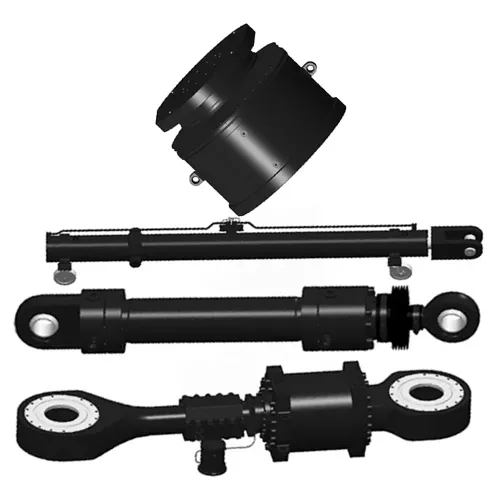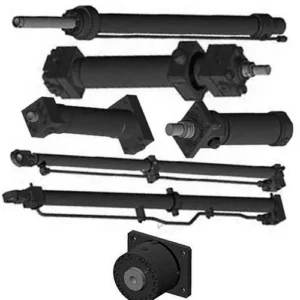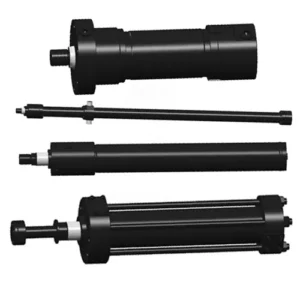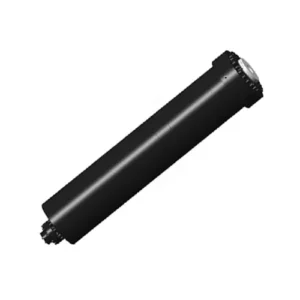Hydraulic Cylinder for Cement Equipment
The Hydraulic Cylinder for Cement Equipment is a critical component designed to deliver high force and precision in various applications within the cement manufacturing process. This hydraulic cylinder plays a vital role in operations such as mixing, pressing, and material handling, ensuring efficiency and reliability throughout the production cycle.
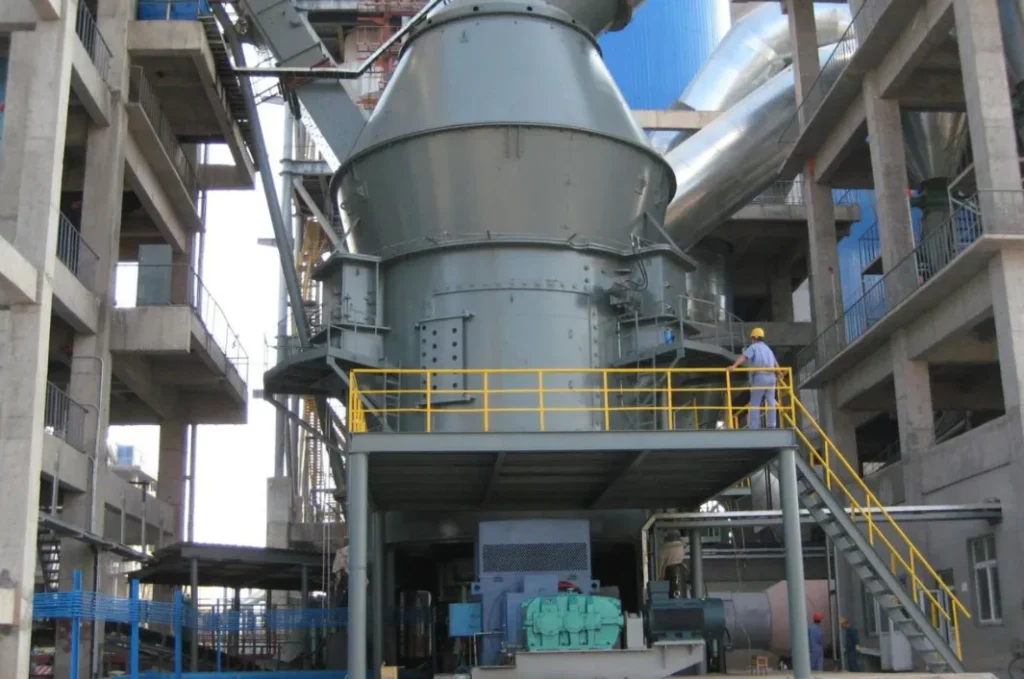
Key Features:
- High Force Output: Engineered to generate significant hydraulic force, this cylinder is capable of handling heavy loads and performing demanding tasks essential to cement production.
- Robust Construction: Made from high-strength materials, it is built to withstand the harsh conditions of cement plants, including high pressures and abrasive environments, ensuring long-lasting durability.
- Smooth Operation: The advanced hydraulic design allows for smooth and controlled movements, enhancing the efficiency of processes like batching, compacting, and material transfer.
- Versatile Application: Suitable for a wide range of cement equipment, including mixers, roller presses, and vertical mills, this cylinder enhances the overall functionality of cement manufacturing operations.
- Low Maintenance Requirements: Designed for minimal wear and tear, the hydraulic cylinder requires less maintenance, reducing downtime and contributing to increased productivity.
The Hydraulic Cylinder for Cement Equipment is an essential component that optimizes performance and efficiency in cement manufacturing, making it indispensable for ensuring high-quality production and effective material handling in the industry.
Cement Equipment Roller Press Cylinder
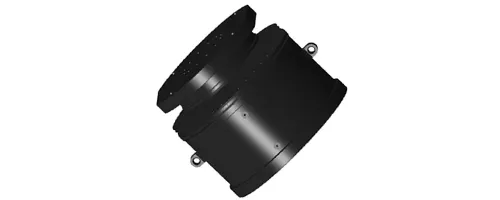
The Cement Equipment Roller Press Cylinder is a vital hydraulic component designed to exert high pressure for the efficient operation of roller presses in cement production. This cylinder provides the necessary force to compress and grind raw materials, ensuring consistent particle size and optimal material quality. Engineered from high-strength materials, it is built to withstand the rigorous conditions of cement manufacturing, including high pressures and abrasive environments. The smooth hydraulic action allows for precise control during the pressing process, enhancing productivity and efficiency. This roller press cylinder is essential for optimizing the performance of cement equipment, contributing significantly to the overall effectiveness of the cement production process.
| Product Name | Cement Equipment Roller Press Cylinder |
| Features: | Ensure the middle position of the clamp head |
| Bore diameter: | 200mm~700mm |
| Rod diameter: | 130mm~500mm Stroke: ≤500mm |
| Thrust force: | Max 5387KN (Cylinder diameter 700mm/pressure14MPa) |
| Cement Equipment Roller Press Cylinder Applications: | Cement Equipment |
Cement Equipment Vertical Mill Cylinder
The Cement Equipment Vertical Mill Cylinder is a crucial hydraulic component designed to provide the necessary force for the operation of vertical mills in cement manufacturing. This cylinder facilitates the grinding and milling of raw materials, ensuring efficient material processing and achieving the desired fineness. Constructed from high-strength materials, it is engineered to withstand the demanding conditions typical in cement plants, including high pressures and abrasive environments. The smooth hydraulic action enables precise control of the grinding process, enhancing operational efficiency and product quality. This vertical mill cylinder is essential for optimizing the performance of cement equipment, playing a significant role in the overall effectiveness of the cement production process.
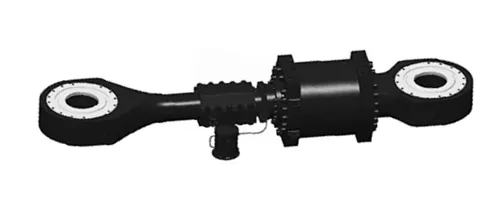
| Product Name | Cement Equipment Vertical Mill Cylinder |
| Features: | Ensure the middle position of the clamp head |
| Bore diameter: | 200mm~700mm |
| Rod diameter: | 130mm~500mm Stroke: ≤500mm |
| Thrust force: | Max 5387KN (Cylinder diameter 700mm/pressure14MPa) |
| Cement Equipment Vertical Mill Cylinder Applications: | Cement Equipment |
Cement Equipment Roll over Cylinder
The Cement Equipment Roll Over Cylinder is a vital hydraulic component designed to facilitate the tilting and rotation of equipment used in cement manufacturing, such as mixers and batch plants. This cylinder provides the necessary force to ensure smooth and controlled movement, allowing for efficient material handling and processing. Constructed from high-strength materials, it is engineered to withstand the harsh conditions typical in cement environments, including high pressures and abrasive materials. The reliable hydraulic action allows for precise positioning and operation, enhancing productivity and safety during cement production processes. This roll over cylinder is essential for optimizing the functionality and efficiency of cement equipment, contributing to the overall effectiveness of manufacturing operations.
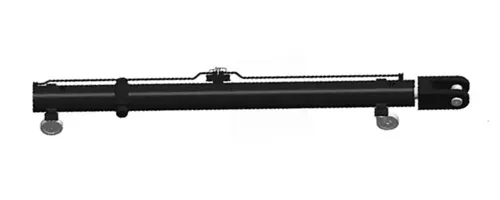
| Product Name | Cement Equipment Roll over Cylinder |
| Features: | Lifting and falling of driving roller |
| Bore diameter: | 180mm~320mm |
| Rod diameter: | 110mm~170mm Stroke: ≤6000mm |
| Thrust force: | Max 1688KN (Cylinder diameter 320mm/pressure 21MPa) |
| Cement Equipment Roll over Cylinder Applications: | Cement Equipment |
Cement Equipment Feeding Cylinder
The Cement Equipment Feeding Cylinder is a hydraulic component designed to provide controlled force for the precise delivery of raw materials into cement production processes, ensuring efficient feeding and consistent material flow.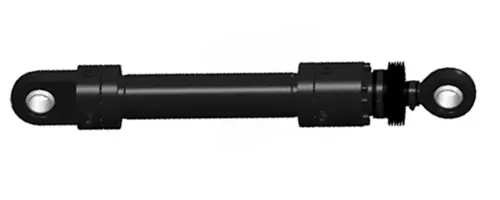
| Product Name | Cement Equipment Feeding Cylinder |
| Features: | Promote the reciprocating movement of the grate bed of the grate cooler |
| Bore diameter: | 80mm~140mm |
| Rod diameter: | 45mm~80mm Stroke: ≤1200mm |
| Thrust force: | Max 385KN (Cylinder diameter 140mm/pressure 25MPa) |
| Cement Equipment Feeding Cylinder Applications: | Cement Equipment |
Advantages of Cement Equipment Hydraulic Cylinder
Cement equipment hydraulic cylinders are essential components used in various cement manufacturing processes, such as in crushers, mills, kilns, and other heavy machinery. These cylinders are designed to handle high loads and extreme conditions, ensuring smooth and efficient operation of cement production lines. Below are the key advantages of using hydraulic cylinders in cement equipment:
1. High Load Capacity
Hydraulic cylinders are known for their ability to generate significant force relative to their size, making them ideal for handling the heavy loads commonly encountered in cement equipment. Whether it’s the movement of large crushers, mills, or kiln components, hydraulic cylinders can manage the substantial forces needed in these applications without compromising performance.
2. Precise Control
Hydraulic systems provide precise and adjustable control over the movement of machinery components. In cement manufacturing, precise control is critical, especially in operations like adjusting crusher gaps, controlling mill operations, or positioning large kiln components. This ensures optimal performance and product quality.
3. Smooth Operation
Hydraulic cylinders provide smooth, continuous motion, which is vital for reducing wear and tear on cement equipment. Unlike mechanical systems, which can cause jerky or inconsistent movements, hydraulic systems ensure steady force application, leading to a longer operational life for the equipment and reduced downtime.
4. Energy Efficiency
Hydraulic cylinders are more energy-efficient compared to traditional mechanical or pneumatic systems. Since hydraulic cylinders rely on pressurized fluid to transmit force, they can generate large amounts of power with minimal energy input. This contributes to reducing the overall energy consumption in cement manufacturing operations.
5. Durability and Longevity
Cement production environments are typically harsh, with high temperatures, heavy loads, and exposure to dust and abrasives. Hydraulic cylinders used in cement equipment are designed with durable materials and advanced sealing technology, enabling them to withstand these challenging conditions. This durability extends the service life of the cylinders and reduces the need for frequent replacements.
6. High Temperature Resistance
In cement manufacturing, especially in kilns, equipment is often exposed to very high temperatures. Hydraulic cylinders used in cement equipment are built with heat-resistant materials and coatings to ensure reliable performance even under extreme thermal conditions. Some hydraulic cylinders can function effectively at temperatures up to 150°C or higher.
7. Compact and Space-Efficient
Hydraulic cylinders are compact yet powerful, offering a high force-to-size ratio. This is particularly useful in cement equipment where space can be limited, allowing for efficient machinery designs without sacrificing performance. Their compact size makes them ideal for integrating into complex and space-constrained equipment layouts.
8. Versatility and Customization
Hydraulic cylinders can be custom-designed to meet the specific needs of various cement production processes. They can be tailored for different stroke lengths, pressure ratings, and mounting configurations, making them versatile and adaptable to a wide range of applications within the cement manufacturing plant.
9. Reduced Vibration and Noise
Hydraulic cylinders operate with minimal noise compared to mechanical systems. This reduction in vibration and noise enhances the working environment and contributes to better operational stability. In cement equipment, this helps prevent structural damage caused by vibrations and reduces operator fatigue.
10. Improved Process Control
Hydraulic cylinders are used in several critical cement equipment processes, such as in crushers (adjusting jaw gaps), mills (controlling roller pressure), and rotary kilns (adjusting positions of rotating equipment). Their ability to provide precise force control enhances overall process management, improving the efficiency and quality of the cement manufacturing process.
11. Low Maintenance Requirements
Hydraulic systems generally require less maintenance compared to mechanical systems. The absence of moving parts like gears or linkages reduces the risk of mechanical wear and tear. Properly maintained hydraulic cylinders are highly reliable and can operate for long periods without frequent service, reducing downtime and maintenance costs.
Hydraulic cylinders in cement equipment offer numerous advantages, including high load capacity, precision, energy efficiency, durability, and the ability to operate under harsh conditions. Their versatility makes them ideal for a variety of applications within the cement industry, from crushers and mills to kilns and material handling systems. The ability to provide smooth, controlled movements in demanding environments enhances the overall efficiency, safety, and longevity of cement production machinery.
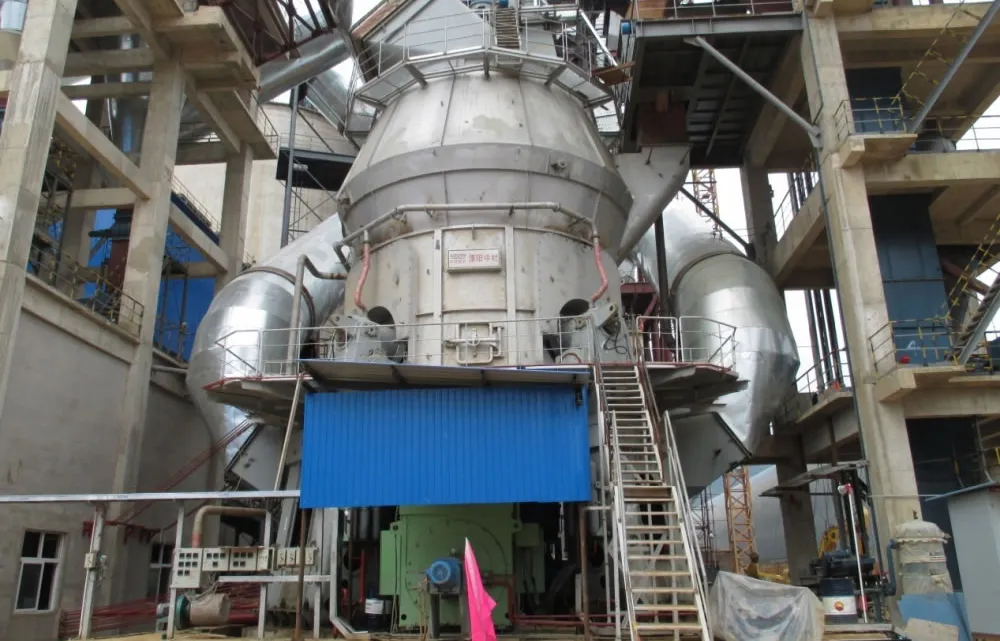
Application of Cement Equipment Hydraulic Cylinder
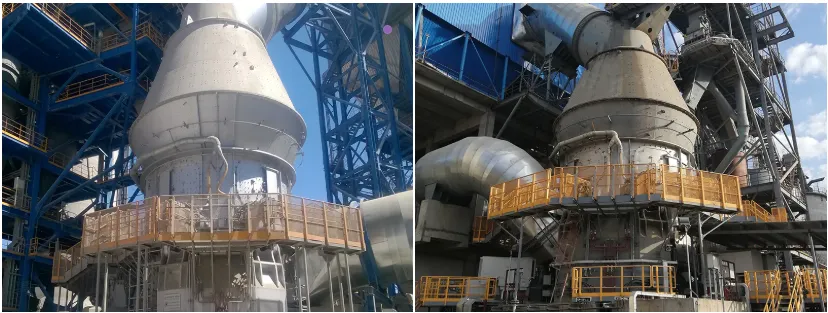
About FMP
FMP is a specialized mechanical manufacturing company dedicated to the production of hydraulic cylinders. Since its establishment, the company has focused on the research and manufacturing of hydraulic technology, successfully transitioning from a diverse product range that included harvesting and construction machinery to specializing in agricultural tractor components. With over a decade of experience in manufacturing and management, FMP ensures high-quality products through advanced production techniques.
As the company has evolved, it has developed a comprehensive machining production line, assembly line, and coating line. Our team comprises skilled management personnel, experienced mechanical designers, and highly trained technicians who work together to maintain stable production quality while effectively controlling process continuity and efficiency.
FMP upholds the philosophy of “Technological Innovation Driving Progress, Quality Creating Brands, Craftsmanship Ensuring Quality, and Building Long-Term Win-Win Relationships.” Our commitment to providing high-quality products and superior customer service remains a core objective as we continue to meet the evolving needs of the market.
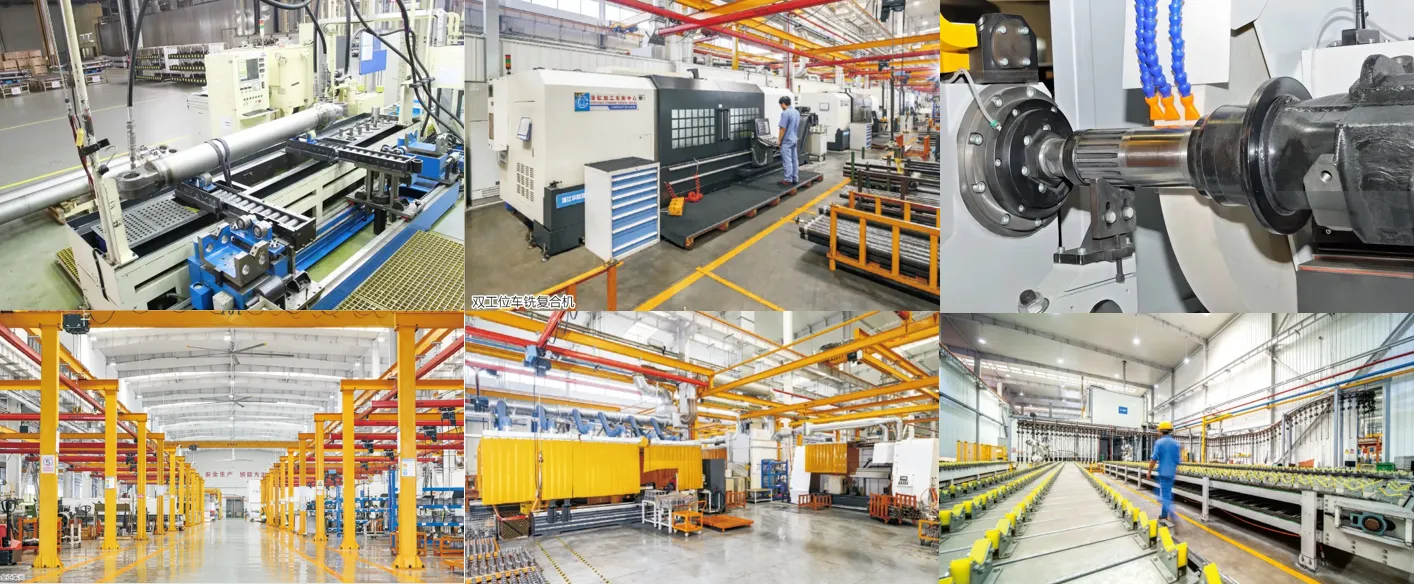
Author: CX

